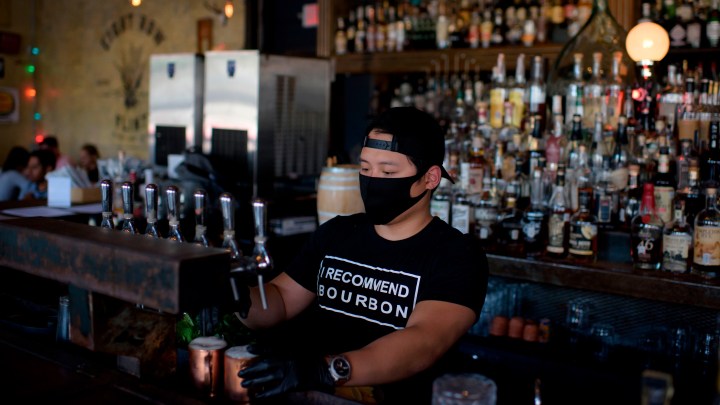
Younger workers aren’t as fazed by losing a job
Younger workers aren’t as fazed by losing a job

If you were to lose your job today, how confident would you feel about finding a new one within six months? That’s a question we asked in our latest Marketplace-Edison Research poll — and it’s especially relevant in this pandemic recession.
Around one in five said they’re not confident at all. And more than 40% said they’re somewhat confident. But a third of respondents said they’d feel very confident. And a lot of that confidence is a product of age.
Evan Niedrauer is 32 years old and lives in Los Angeles. He works as a lighting designer, which means he does a lot of different things.
“I’ve got my own personal line of lamps and chandeliers,” he said. “I’m refurbishing some lights at a 1950s diner.”
The way Niedrauer puts it: He has his fingers in a lot of pies.
“I’m overseeing some electrical work being put into a kids’ museum in Santa Monica, and I’m building a custom LED mask for a MMA fighter,” he said.
When the Marketplace-Edison Research Poll asked, Niedrauer told us he’s very confident in his ability to find work within six months.
In fact, only about one in seven respondents between the ages of 18 and 34 told us they’re not confident in their ability to find work.
Niedrauer said if his current gigs dry up, he has a lot of skills he could fall back on.
“I could find something that could get me by, that I wouldn’t necessarily be satisfied doing, but I would have the skills to make some sort of wage,” he said.
Younger workers haven’t had as much time to focus on a specialty, said Peter Orazem, labor economist at Iowa State University.
As a result, “the skills they have tend to be more general and more applicable to lots of firms,” he said.
After the Great Recession in 2008, Orazem said older workers were unemployed about twice as long as younger workers.
“What you found was that the younger people were much more flexible in terms of switching to a different type of a job,” he said.
Younger workers are also generally more optimistic about the economy, according to Sarah House, an economist at Wells Fargo.
“They tend to have a more upbeat assessment of their future earnings, their ability to save for retirement [and] even what interest rates they might get on their savings account,” she said.
And the recovery — so far — may be boosting their optimism. Many young people work in the leisure and hospitality industry, which was hit hard at first, but has been bouncing back vigorously.
Check out the full poll results here, and read more about our methodology below:
The Marketplace-Edison Research Poll is a national survey of Americans 18 and older. A total of 1,647 respondents were interviewed, with 725 interviews conducted by telephone and 922 interviews conducted online. The interviews were conducted from Sept. 25 through Oct. 8, 2020, in both English and Spanish. For purposes of analysis, respondents who identify as Black or Hispanic/Latino were oversampled and then weighted back to their proper proportion of all adults.
The data was weighted to match the most recent United States population estimates from the U.S. Census Bureau for age, gender, race, income and region of the country.
Asian Americans are included and represented in the poll findings, but we did not oversample in a way that would allow us to analyze this group discretely.
Editor’s note: While our poll asked respondents to identify themselves as Hispanic or Latino, we’ve changed the language here to Latinx to reflect Marketplace’s editorial guidelines.
There’s a lot happening in the world. Through it all, Marketplace is here for you.
You rely on Marketplace to break down the world’s events and tell you how it affects you in a fact-based, approachable way. We rely on your financial support to keep making that possible.
Your donation today powers the independent journalism that you rely on. For just $5/month, you can help sustain Marketplace so we can keep reporting on the things that matter to you.












